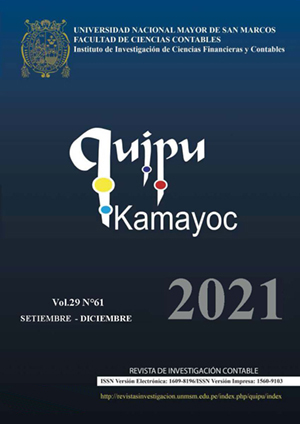The relevance of finance within a sustainable business model in vulnerable populations
DOI:
https://doi.org/10.15381/quipu.v29i61.21265Keywords:
sustainability, circular economy, value chains, financeAbstract
Objective: Analyze the relevance of the finance within a sustainable business model in vulnerable population. Method: A qualitative research was carried out, based on the review of the applicable literature including the concepts of sustainability, sustainable finance, value chains, climate change and circular economy. Also, it included the review of bibliographic databases such as Scopus, Clarivate, Academia, and Google Scholar. The literature review of classical finance was excluded. Results: It has been identified that financial aspects are included in the management of sustainable business; however, these are carried out in a conventional way, making it difficult for them to reach the necessary funds. A model is proposed, which is approached from a value chain perspective and considers the management of environmental, social and economic risks, seeking that those who face the most risk receive the highest return. Conclusion: In order to achieve that a conceptual model is implanted, in which sustainable finance has a clear participation, it is relevant to ensure greater empowerment to the populations that are being favored through better financial training; likewise, it is essential that the financing sources deepen their evaluation concerning risks and returns, and that the results are measurable in the financial statements of each business.
Downloads
Downloads
Published
Issue
Section
License
Copyright (c) 2021 Walther Hernán Reátegui Vela, Ana Inés Reátegui Vela

This work is licensed under a Creative Commons Attribution 4.0 International License.
AUTHORS RETAIN THEIR RIGHTS:
a. Authors retain their trade mark rights and patent, and also on any process or procedure described in the article.
b. Authors retain their right to share, copy, distribute, perform and publicly communicate their article (eg, to place their article in an institutional repository or publish it in a book), with an acknowledgment of its initial publication in Quipukamayoc .
c. Authors retain theirs right to make a subsequent publication of their work, to use the article or any part thereof (eg a compilation of his papers, lecture notes, thesis, or a book), always indicating the source of publication (the originator of the work, journal, volume, number and date).





























